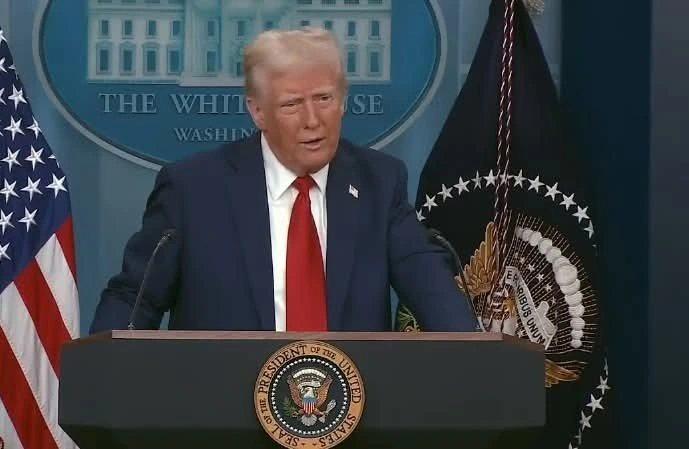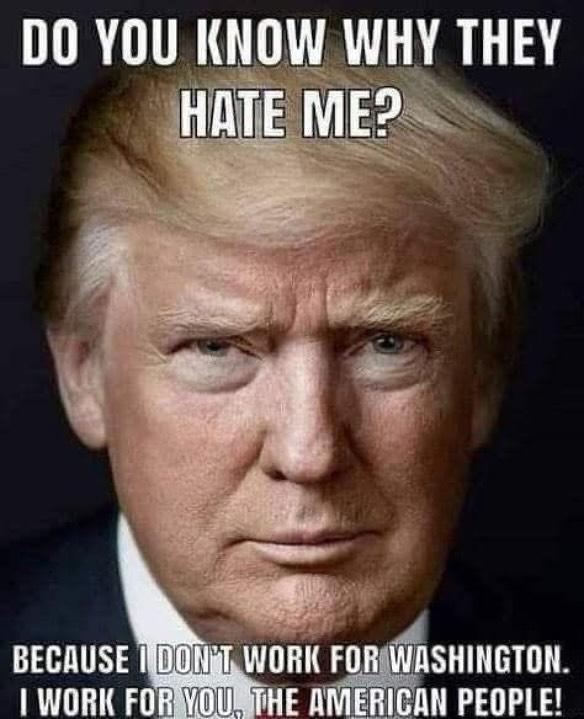Donald Trump, the 45th President of the United States, has long been a figure who elicits passionate reactions. From fervent supporters who see him as a champion of the people to vocal critics who accuse him of undermining democracy, Trump has always been a polarizing force in American politics. One of his most consistent talking points during his presidency, and even in the years since, is his assertion that his opposition stems not from any personal shortcomings but from his refusal to work for Washington elites. Instead, he insists, he works for the American people. “Do you know why they hate me? Because I don’t work for Washington. I work for you, the American people!” This declaration encapsulates much of Trump’s political identity, positioning himself as an outsider who is fighting for the “forgotten” citizens of America, and it resonates deeply with his base. But how accurate is this claim, and what does it reveal about his political approach and his critics?

At the heart of Trump’s statement is the idea of being an outsider. Throughout his campaign for president, and indeed during his tenure in office, Trump frequently depicted himself as someone who was not part of the political establishment in Washington, D.C. He portrayed himself as a businessman, someone who had succeeded outside of the traditional corridors of power. His appeal to voters was clear: he was not beholden to political interests, lobbyists, or party lines. He claimed that his wealth and independence allowed him to focus solely on the interests of the American people, rather than the entrenched bureaucracies and power structures that dominated Washington politics for decades.
This outsider narrative helped Trump build a strong, loyal base of supporters who were disillusioned with the traditional political class. Many of his voters felt ignored or marginalized by politicians in Washington, who they believed were more concerned with maintaining their power than addressing the needs of ordinary Americans. Trump tapped into this sentiment, positioning himself as a champion of the working class, particularly in industrial regions that had seen job losses and economic decline. By framing himself as someone who could not be controlled by the political elite, Trump was able to present himself as a defender of the people against the powers that be.
However, the reality of Trump’s political actions often contradicted this outsider image. While he may have campaigned as a man who would challenge the Washington establishment, much of his administration’s policy agenda aligned with the interests of corporate America and the wealthiest Americans. Trump’s tax cuts, which overwhelmingly benefited the rich, were seen by many as a victory for the elite, not the ordinary American worker. Furthermore, his close relationships with big business figures and his frequent use of his personal brand for financial gain raised questions about how much he truly represented the “forgotten” American worker. His administration’s deregulatory agenda also largely benefited large corporations, even as it left behind environmental protections and worker safeguards that had been put in place by previous administrations.
This paradox—Trump’s self-proclaimed outsider status versus his policies that often favored the rich and powerful—has been a point of contention for his critics. For many, Trump’s narrative of being an anti-establishment figure appears disingenuous, especially when weighed against the concrete outcomes of his policies. Critics argue that his political decisions, particularly those related to taxes, deregulation, and healthcare, have primarily served the interests of the wealthy elite and large corporations rather than ordinary Americans.
Despite these criticisms, Trump’s claim of working for the American people has a certain resonance for his supporters. His rhetoric about fighting for the “forgotten” people, particularly in the Rust Belt and other economically distressed regions, appeals to voters who feel left behind by globalization and technological change. Trump’s promises to bring back jobs, rein in illegal immigration, and put America first in trade deals resonated deeply with many working-class voters who had not felt adequately represented by traditional politicians.
Moreover, Trump’s populist approach was not just about economic policy; it was also about culture. He positioned himself as a defender of traditional American values against what he saw as a liberal elite that was out of touch with the concerns of average Americans. His frequent critiques of the media, academia, and the political establishment were designed to portray himself as a champion of the people in a battle against forces that, in his view, were undermining American society. This rhetorical strategy helped galvanize his base, making them feel that they were part of a larger movement that was fighting for their values and their future.
However, Trump’s critics argue that this “us versus them” rhetoric only deepens the divisions in American society. By framing the political debate in such binary terms, Trump has cultivated an atmosphere of hostility and mistrust between different groups of Americans. His frequent attacks on the media, for example, have not only undermined trust in journalism but have also fueled an environment where objective truth is often dismissed as “fake news.” This erosion of trust in institutions and experts has had long-lasting consequences, particularly during the COVID-19 pandemic, when misinformation and conspiracy theories spread widely among his supporters.
In many ways, Trump’s statement, “Because I don’t work for Washington. I work for you, the American people!” captures the essence of his political identity. He positions himself as an outsider battling the elites, yet his policies and actions have often aligned with the interests of the wealthiest Americans. His appeal is rooted in a deep-seated frustration with the status quo, but his critics argue that his rhetoric often disguises the realities of his administration’s agenda. Whether one agrees or disagrees with Trump’s policies, his ability to tap into the frustrations of ordinary Americans and present himself as their advocate remains a defining feature of his political persona.

In conclusion, Donald Trump’s declaration that he works for the American people and not for Washington has resonated deeply with many voters, especially those who feel alienated by traditional politics. While this outsider image helped him build a loyal base, his policies and actions often conflicted with the ideals he promoted. Nevertheless, his message of populism and his portrayal of a battle against the Washington establishment continue to shape the political landscape in profound ways. Whether or not one agrees with Trump’s approach, his influence on American politics remains undeniable, and his ability to challenge the traditional political norms has left an indelible mark on the nation’s political discourse.






